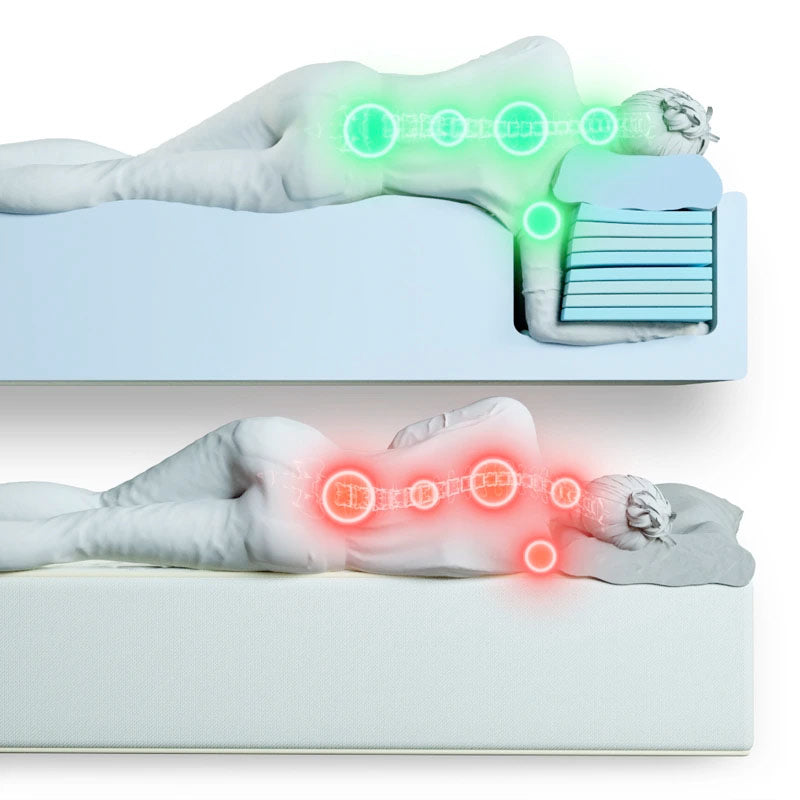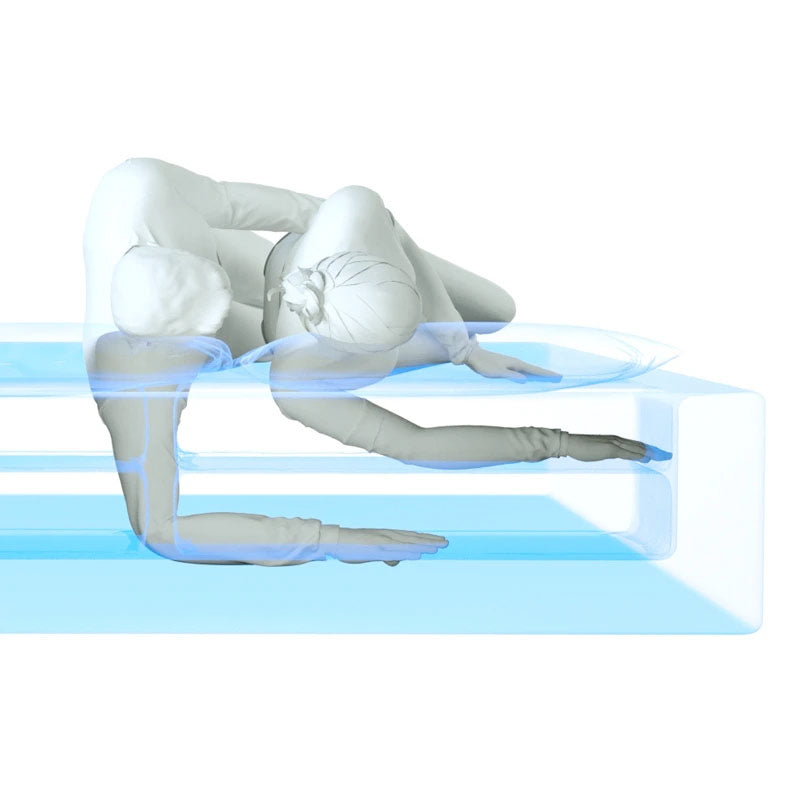Sleep. We all know we need it, but sometimes it's hard to come by.
Is it possible to make up for lost slumber? According to the restoration theory of sleep, the answer is yes, and that’s because our bodies are trying to tell us something.
Here's what you need to know about this little-known theory, how it could help you get the most out of your zzzs, and how SONU Sleep can help.
Oswald's Restoration Theory: What Is It?
Oswald's Restoration Theory states that you need to rest to recover energy lost throughout the day so that you can be productive and healthy.
Dr. Ian Oswald, a sleep researcher and psychiatrist who studied restoration in individuals, noticed that energy needs were not being met due to environmental factors. This theory is supported by research showing that people who get less sleep than usual tend to be less productive and experience health problems.
In fact, it's been said that those who do not get enough sleep will suffer consequences like:
- Weight gain
- Outbursts of anger
- Memory loss
But those aren't the only consequences. There's also a theory that those who don't get enough sleep to a severe enough degree can die if the lack of sleep continues. As you can see, it's important to pay attention to your sleep — seven to eight hours of it, according to the CDC.
Why Did Oswald Come Up With This Theory?
Oswald first suggested the restoration theory of sleep in 1931. Further building on the restoration concepts discovered by his predecessor Johannis Mayer. Oswald said that sleep is important for restorative purposes. According to him, sleep deprivation can result in mental problems and even death.
Oswald's theory was that we constantly expend energy and need to be replenishing this energy to restore ourselves.
What Does the Restoration Theory of Sleep Mean to Us?
The restoration theory of sleep is one of the oldest theories on restoration. Its central idea (restoration happens only during rest periods) has important implications for health and biological processes.
Oswald's Restoration Theory was first published in the 1920s by Dr. William C. Dement (1927), often called the Father of Sleep Medicine. If this theory is correct, getting enough sleep each night could be vital for your health.
The theory suggests that by sleeping or napping during the day, you might be able to sleep less at night without experiencing negative effects. However, the theory only applies if you sleep or nap during the day for a certain amount of time. If you cut out all daytime sleep, your body may not be able to catch up on its nighttime sleep.
What Are Some Counter Arguments for the Restoration Theory of Sleep?
Two main counter arguments for restoration theory are:
- Restoration may not be necessary every night since people do not use all their energy each day.
- Different organisms might have evolved unique strategies for restoration because there are so many different types of organisms out there.
What Are the Benefits of Oswald's Restoration Theory of Sleep?
There are many benefits to good rest while following Oswald's restoration theory of sleep.
Physically, getting the same amount of sleep every night can help you:
- Maintain a healthy weight.
- Improve your immune system.
- Reduce your risk of developing chronic diseases.
Mentally, getting enough sleep can help you:
- Stay focused and productive during the day.
- Make better decisions.
- Improve your emotional well-being.
Are Restoration and Homeostasis the Same Thing?
Homeostasis is when natural fluctuations in an organism's internal environment are neutralized through physiological processes to keep its internal conditions relatively stable.
Restoration is a specific aspect of Oswald's restoration theory that focuses on sleep to restore energy lost during the day.
Are Restoration and Metabolism the Same Thing?
Restoration and metabolism are not the same.
Metabolism is just another word for restoration that focuses on using restoration to maintain weight control. Metabolism is usually a process within an organism to maintain healthy energy levels, healthy weight, and overall proper functioning. The way your body breaks down and uses your food influences your metabolism.
How Are Restoration and Sleep Connected?
Restoration and sleep are connected because sleep makes it easier for the body to restore itself. However, sleep is not the only way to get enough restoration. Sleep-deprived people can catch up on their restoration by getting more exercise.
Restoration may not be necessary every night, since you generally do not use all of your energy each day. Different organisms may also have evolved unique restoration strategies.
Why Do Humans Need Restoration?
Humans need restoration because they expend energy throughout the day through activity and mental processes (such as moving around and processing information). Overall, you won't be as productive or healthy if restoration doesn't occur. This is because you will lack the energy needed to perform everyday tasks.
In addition, restoration is important because it can help prevent obesity and chronic diseases (such as heart disease and diabetes).
How Do Disruptions to Restoration Affect Humans?
Disruptions to restoration can have negative effects on you by:
- Interfering with your ability to focus.
- Making you more emotional or impulsive.
- Increasing your risk for injury.
When your body is not sufficiently able to restore and repair itself throughout the day, your bodily processes can become impaired.
What Are Some Components of Restoration Theory?
Restoration is defined as the idea that sleep at night helps restore energy lost during the day, ensuring that organisms are productive and healthy. Restoration can refer to replenishing one's "energy bank account" and healing the body from fatigue or disease.
Thus, restoration has two key components:
- Restoration occurs through restoration processes;
- Restoration equals sleep.
Other important aspects of restoration theory include: restoration requires similar amounts of sleep every day; restoration may be affected by genes and health conditions, and restoration varies between individuals because of these factors.
Following the restoration theory of sleep has numerous benefits, including improving your immune system, ensuring you maintain a healthy weight, and preventing you from being accident-prone. It also ensures that you have a good night's rest every night.
How Can People Follow Oswald's Restoration Theory?
There are a few ways to follow the restoration theory of sleep in your life, regardless of your work or personal schedule:
- Give yourself a bed that makes it easy to fall asleep and stay asleep. The SONU Sleep System features Support Pillows and a Comfort Channel for optimal range of motion and pressure relief while you are in bed. Our Comfort Channel allows you to fully immerse your arms and shoulders into the mattress, preventing strain and pressure points. With SONU, enjoy a sink-in support system, proper head and neck support, and premium, high-resilience foam that all support deep sleep so your mind and body can focus on restoration instead of finding a comfortable position.
- You can fill out a sleep diary every morning to see if they are sleeping the same amount of time each night. If they are not, they may want to make some changes to increase wellness.
- You could also take naps during the day to increase restoration. Try to get about 7-9 hours of sleep per night. If you do not feel restored after waking up, you may want to try sleeping in for a few hours or taking a nap in the early afternoon.
- In addition, increasing exercise levels throughout the day will result in increased restoration, as exercise increases energy expenditure throughout the day meaning deeper sleep at night.
- Finally, you should try to reduce stress levels as much as possible so that restoration can occur more smoothly.
Are There Any Potential Dangers of Restoration?
Yes, there are some potential dangers of restoration. For example, restoration differs between people, certain factors such as stress can affect restoration processes being successful.
Restoration may also be impaired by other factors such as sleep disorders or diet. Additionally, restoration doesn't help restore all parts of the body.
How Long Do Restoration Processes Last?
The restoration process lasts throughout the entire 24-hour cycle, but it varies with each restoration process. Some restoration processes last for minutes, while others can last for hours or even days.
How Does Restoration Vary Between Individuals?
The restoration process can vary between people too. There are two main reasons for this:
- Restoration processes last different lengths of time.
- Restoration times often vary according to activity and occupation.
The first point considers spending more time awake than others require. It also considers whether you need more restorative sleep than those who do not spend as much time awake.
Activities also affect restoration processes. This is because some activities such as exercise consume more energy than other activities such as watching television or reading. Thus, the amount of restoration that an individual needs depends on their activity level throughout the day.
One of the best things you can do for yourself after a long, taxing day is get a good night of sleep — and the right sleep system is key. With a 10-inch-deep Comfort Channel for arm and shoulder immersion, head and neck support, and upper torso and spine alignment, SONU can help you get the rest you deserve.
Does Restoration Depend on Age?
Another reason why restoration varies with each person is that genetics can also impact your body's restoration process. Oswald lists several characteristics that are passed down from parent to child, such as the restoration process lasting longer for adolescents or restoration processes being affected by age.
Infants and children require more restoration than adults because their restoration processes last longer and occur in a short amount of time. Children experience rapid changes in restoration processes throughout their development.
What Is the Conclusion About Restoration Theory?
It's been proven by science that our bodies are trying to tell us something when we're sleeping. And if you want your body and mind to be at your best, then you should follow Oswald's theory of restorative sleep.
Although much more research is necessary, this theory could help us better understand the importance of sleep and how to improve our overall quality of rest.
Until we get more clarity, you can get more rest with the SONU Sleep System. It’s designed so you can enjoy improved head, neck, and shoulder support thanks to SONU’s Support Pillows and Comfort Channel. Place your top pillow, like the SONU Top Pillow Deluxe, over the Support Pillows for optimal comfort, and enjoy the sleep of your dreams.
Sources:
Physiology of Sleep - StatPearls | NCBI Bookshelf
Current Concepts in the Neurophysiologic Basis of Sleep; a Review | NCBI.gov
Data and Statistics - Sleep and Sleep Disorders | CDC






















